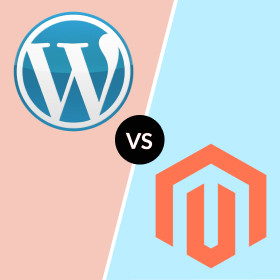
Joomla and WordPress, both are different tools but are used for the same purpose. While WordPress offers many advanced functionalities, Joomla stands out as one of the top content management systems (CMS). We can say that both are free, powerful, and great competitive tools for each other. This is the reason, people who are new to website creation often struggle to decide between these two platforms. If you are planning to complete your next website project using any of these tools, you can read this post to take a brief look at both.
In this guide, we will learn the differences between Joomla and WordPress. Let's get started!
What is Joomla?
Joomla is a free and open-source CMS (content management system). Currently, it has around 2 million active users. This platform is one of the most successful tools on the market that helps countless individuals, startups, and small and large businesses establish a strong online presence. That's why, this tool is the third most used CMS after WordPress all over the world.
Originally, the Joomla CMS was intended to design portal-like to integrate login forms and membership systems. But, today, it has become one the fastest growing CMS for various niches. Many top websites are powered by this incredible content management system such as Harvard University, MTV Greece, The FashionSpot, and others.
What is Wordpress?
Like the above, WordPress is a free and open-source CMS that empowers users to create different types of websites. This platform is one of the best content management systems currently. Whether starting a blog or offering professional services, WordPress is a cost-effective, and easy-to-use tool for creating a custom website tailored to your needs.
Due to its open-source functionality, web developers can easily manage and modify website on their specific needs and offers custom wordpress development services. This tool is great for creating an online presence for small and medium enterprise businesses, ecommerce store, education websites, and many more. Some excellent examples of WordPress-built websites are PlayStation Blog, Whitehouse.gov, and Sony Music.
Joomla Vs Wordpress: Which One is Better?
WordPress and Joomla are powerful platforms for creating custom websites for yourself. Joomla is a more flexible tool, but if you are a beginner, you may have to go through a learning process. You will have to spend time learning how to use its advanced tools and functionalities for website development. On the other hand, WordPress is quite easy to use and does not require technical knowledge. This platform is a better option for beginners and you can prefer to have more opportunities to access more plugins and functions on WordPress. Here, we are doing a compression between both the devices:
1) User-Friendliness
Joomla is less friendly to beginners. It provides a category and article system for organizing content. That takes a longer time to understand, especially if you are a newbie to CMS tools. Its administrative panel is overwhelming.
WordPress, on the other hand, comes with intuitive features and functionalities. It provides a more accessible platform for website development. You may find yourself disorganized in the beginning, but with time it becomes more manageable. It's easy to use, depending on your level of website design and development experience.
2) Content Organization
Joomla provides a WYSIWYG editor to edit your content. This allows you to install additional extensions and simplify template modifications. You can customize the modules and layouts to present your content more attractively and appealingly. However, it may not have the ability to create custom taxonomies which may make it difficult for you to manage large amounts of content.
WordPress is a better choice than Joomla, especially if you want to organize your content seamlessly. This platform is designed for website development. This means it is the most suitable option for managing large amounts of content. With its WordPress taxonomy, you can easily organize and manage your pages and make your posts more structured for your audience.
3) Design and Performance
Joomla offers 800 extensions in its huge library. The platform is already equipped with many built-in features. Joomla uses front-end and back-end templates, which can be found on websites like ThemeForest. The template can be edited using the Joomla editor or using a program like Joomlart Page Builder. Different templates can be used for different pages in Joomla.
You can easily access over 58,000 free and paid plugins in WordPress. These tools help you improve your website structure and empower you to increase the security of your ecommerce web development. Additionally, WordPress is home to over 8000 free and paid themes and many other third-party marketplaces. You can edit these topics according to your specific concerns.
4) SEO (Search Engine Optimization)
Both tools are excellent choices for managing and optimizing your website based on SEO. Joomla provides good built-in SEO tools. It facilitates users to use advanced and best SEO tools to rank your website higher in search engines. This platform offers an SEO extension like EFSEO or a page builder like Quix. However, some Joomla can be tricky and difficult for beginners.
WordPress emperors users to effortlessly manage their SEO features, such as meta tags, permalinks, and image alt text. You can get access to several SEO plugins that will help you refine your SEO strategies. For example, Yoast SEO helps your website improve its rankings. Furthermore, many analytics and tracking features in Wordpress development facilitate you to analyze your website performance.
5) Online Sales and Payment Integration
If you want to start an ecommerce platform, prioritizing secure payment is crucial. Joomla has eCommerce features that can be added with free and paid extensions. With the help of joomla web development company, you can make product catalogs and shopping cart pages, handle transactions, and accept payments through more than 60 gateways.
Wordpress development provides plenty of tools and plugins to manage payment integration. WooCommerce is one of the most popular options. It works with more than 100 payment gateways that accept payments from both national and international. WooCommerce can handle most of the needs of an ecommerce business, from making product pages to shipping orders.
Final Words
Joomla and WordPress are top-notch CMS platforms. Today, countless people use them to create, develop, and design their online presence with the help of a Website development company in Canada. We hope this guide helped you understand the difference between Joomla and WordPress. After going through five important aspects of these tools, we can conclude that if you want easy-to-use features and functions then WordPress is closer to you, while for advanced designers, using WordPress can be the right decision.
Related Articles
![How Much Does It Cost to Build a Website [Updated Guide 2024]](https://www.digitalfolks.co/public/storage/uploads/blog/jpg/2024-07-101211206.jpg)
How Much Does It Cost to Build a Website [Updated Guide 2024]

CMS (Content Management System)- Advantages and Disadvantages

What is The Difference Between React and React Native

Best Website Builder for Small Business 2025

Best WordPress Plugins for Your Website

Web Design vs. Web Development: Key Differences & Which One You Need?

Best WordPress Themes in 2025 (Free and Paid)

What is a Shopify Partner and What are the Key Benefits?
Recent Blogs


Magento vs WordPress: Which is Best for Your Business?

How to Pick the Best SEO Company in Vancouver?

White Hat SEO Techniques: Everything You Need to Know
Categories
Newsletter
Archives
- December 2022
- April 2023
- August 2023
- December 2023
- July 2023
- June 2023
- May 2023
- November 2023
- September 2023
- April 2024
- August 2024
- December 2024
- February 2024
- January 2024
- July 2024
- June 2024
- March 2024
- May 2024
- October 2024
- September 2024
- April 2025
- August 2025
- February 2025
- January 2025
- July 2025
- June 2025
- March 2025
- May 2025
- November 2025


.webp)